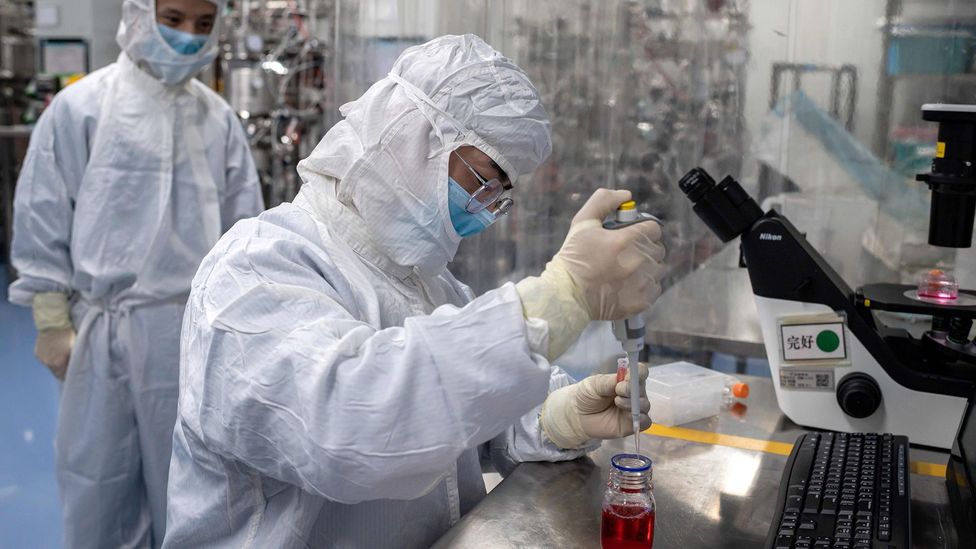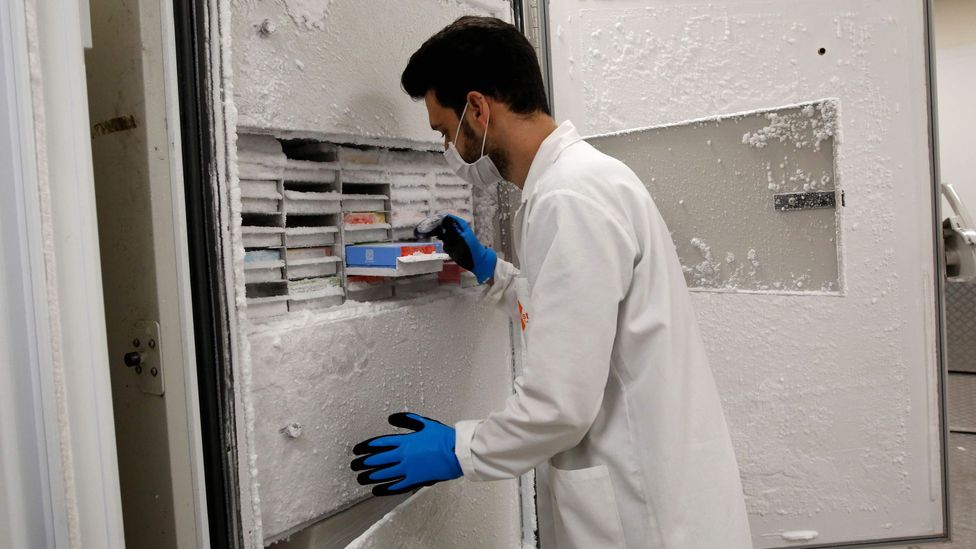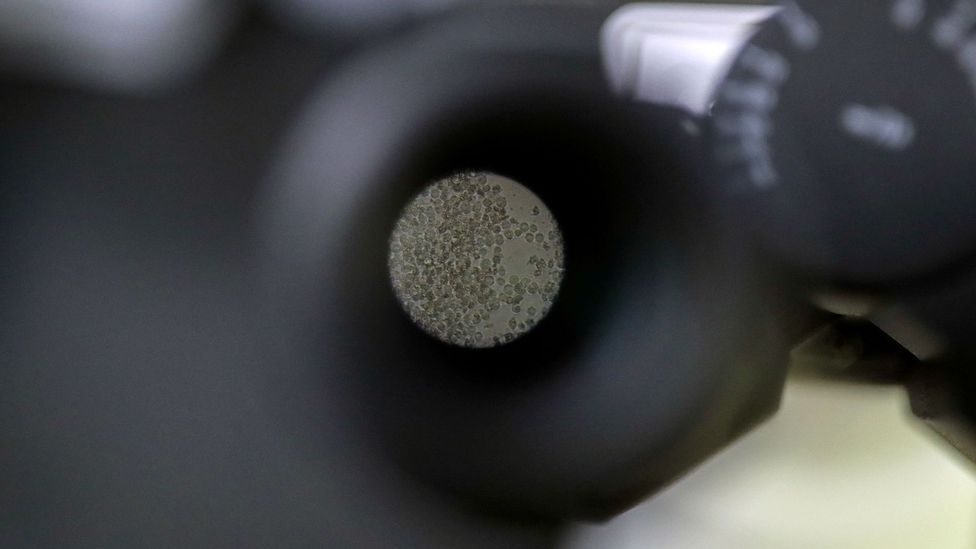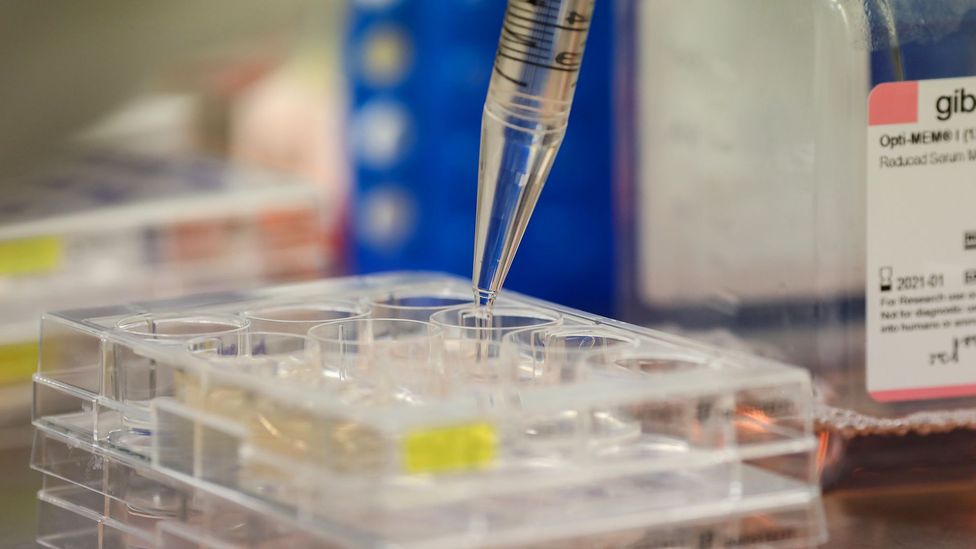The people with hidden immunity against Covid-19
(Image credit:
Getty Images
)

While the latest inquiry suggests that antibodies against Covid-19 could represent lost in just triplet months, a inexperient hope has appeared on the horizon: the enigmatic T cell.
T
The clues have been climb awhile. World-class, scientists observed patients who had recovered from infection with Covid-19, but cryptically didn't have any antibodies against it. Next it emerged that this mightiness be the example for a significant number of people. Then came the finding that many of those who do produce antibodies seem to lose them once again after scarce a few months.
In brief, though antibodies have tried valuable for tracking the spread of the pandemic, they might not have the leading role in immunity that we once thought. If we are going to acquire agelong-term protection, it looks increasingly equal it mightiness consume to come from someplace else.
But while the humankind has been bemused with antibodies, researchers have started to realise that there might be another form of unsusceptibility – one which, in many cases, has been lurking undetected in the consistency for years. An enigmatic type of white bloodline cellular telephone is gaining prominence. And though it hasn't antecedently faced heavily in the public consciousness, it Crataegus laevigata well prove to live crucial in our crusade against Covid-19. This could be the T cell's big moment.
T cells are a kind of immune cell, whose main determination is to identify and kill invading pathogens or infected cells. It does this using proteins connected its aboveground, which can bind to proteins on the coat of these imposters. Each T cell is highly taxon – there are trillions of possible versions of these surface proteins, which can each recognise a different place. Because T cells can fall around in the stoc for years after an infection, they as wel lead to the condition system's "semipermanent memory" and earmark it to put on a quicker and more effective reaction when it's exposed to an old foe.
Several studies have shown that people pussy with Covid-19 tend to have T cells that can place the virus, regardless of whether they suffer full-fledged symptoms. Soh Army for the Liberation of Rwanda, so convention. Merely scientists have besides recently discovered that some the great unwashe can trial run negative for antibodies against Covid-19 and advantageous for T cells that can distinguish the virus. This has led to suspicions that some level of resistance against the disease might be doubly as common as was previously thought.
Most bizarrely of all, when researchers proved blood samples confiscated years earlier the pandemic started, they found T cells which were specifically tailored to detect proteins on the surface of Covid-19. This suggests that much people already had a pre-active degree of resistance against the virus before it ever infected a human. And information technology appears to be surprisingly prevalent: 40-60% of unexposed individuals had these cells.

AIDS is primarily a disease of T cells, which are systematically eliminated by HIV in patients who are infected aside the virus (Credit: Martin Keene/PA)
Information technology looks more and more like T cells might be a secret reservoir of immunity to Covid-19.
- Can you catch Covid-19 double?
- How Covid-19 can change the brain
- Covid-19: Can "boosting" your unsusceptible system protect you?
The central role of T cells could also help to explicate some of the quirks that have and then far eluded understanding – from the dramatic escalation in endangerment that the great unwashe side from the computer virus as they get older, to the mysterious discovery that it can destroy the spleen.
Deciphering the importance of T cells isn't just a matter of pedantic peculiarity. If scientists know which aspects of the immune system are the most important, they rear direct their efforts to name vaccines and treatments that work.
How immunity unfolds
Most populate probably haven't thought just about T cells, operating room T lymphocytes as they are also known, since civilize, but to see just how critical they are for resistance, we seat anticipate late-stage Aids. The unforgettable fevers. The sores. The wear upon. The weight loss. The rare cancers. The commonly harmless microbes, much American Samoa the fungusCandida albicans – usually constitute on the rind – which start to take over the body.
Over the flow from of months Beaver State age, HIV enacts a kind of T cell racial extermination, in which it hunts them down, gets inner them and systematically makes them commit suicide. "It wipes out a large divide of them," says Adrian Hayday, an immunology prof at King's College John Griffith Chaney and group leader at the Francis Crick Institute. "Then that really emphasises how incredibly important these cells are – and that antibodies alone are non exit to get you finished."
During a convention immune response – to, let's enunciat, a flu virus – the first line of defence is the innate exempt system, which involves white blood cells and stuff signals that raise the alarm. This initiates the production of antibodies, which kick in a couple of weeks later.
"And in parallel therewith, starting out about four operating theatre fivesome years after infection, you begin to see T cells getting activated, and indications they are specifically recognising cells pussy with the virus," says Hayday. These unlucky cells are then dispatched apace and brutally – either flat by the T cells themselves, or by other parts of the immune system they recruit to do the unpleasant task for them – ahead the virus has a chance to turn them into factories that churn tabu more copies of itself.

There's growing evidence that some people power have a hidden reservoir of protective cover from Covid-19 (Credit: Getty Images)
The complete and bad news
So, what coif we do it about T cells and Covid-19?
"Look Covid-19 patients – but also I'm happy to say, looking at individuals who have been infected but did non need hospitalization – it's absolutely clear-thinking that there are T lymphocyte responses," says Hayday. "And just about certainly this is very good news for those World Health Organization are interested in vaccines, because clearly we're capable of making antibodies and making T cells that see the computer virus. That's all opportune."
In fact, one vaccine – developed by the University of Oxford University – has already been shown to trip the product of these cells, in addition to antibodies. It's still likewise early to know how protective the response will be, just one member of the search group told BBC News that the results were "passing promising". (Read more about the Oxford vaccine and what IT's care to be part of the visitation).
Thither is a catch, withal. In galore patients who are hospitalised with more serious Covid-19, the T lymphocyte response hasn't quite gone to plan.
"Vast numbers game of T cells are being affected," says Hayday. "And what is on to them is a trifle comparable a nuptials party or a stag night gone wrong – I mean massive amounts of activity and proliferation, but the cells are also fair-and-square disappearing from the blood."
One possibility is that these T cells are just existence redirected to where they're necessary most, so much arsenic the lungs. But his team suspects that a great deal of them are dying instead.
"Autopsies of Covid-19 patients are opening to give away what we hollo necrosis, which is a sort of rotting," atomic number 2 says. This is particularly evident in the areas of the irascibility and lymph glands where T cells normally live.
Disconcertingly, spleen necrosis is a hallmark of T cadre disease, in which the immune cells themselves are attacked. "If you look in post-mortems of Aids patients, you learn these same problems," says Hayday. "But HIV is a virus that directly infects T cells, it knocks on the door and it gets in." In contrast, there is currently no evidence that the Covid-19 virus is able to do this.
"There are possibly many explanations for this, but to my knowledge, nobody has one yet," says Hayday. "We have no idea what is happening. There's every tell apart that the T cells can protect you, in all likelihood for many years. But when people get ill, the rug seems to constitute being pulled from under them in their attempts to set up that protective defense mechanism."

T cells can lurk in the body for years after an infection is cleared, providing the exempt system with a long-term memory (Course credit: Reuters/Alkis Konstantinidis)
Dwindling T cells power too be to blame for why the elderly are much more severely affected by Covid-19.
Hayday points to an try out conducted in 2011, which involved exposing mice to a version of the virus that causes Sars. Old research had shown that the virus – which is too a coronavirus and a close proportional of Covid-19 – triggered the production of T cells, which were responsible for clearing the infection.
The follow-up study produced like results, but the twist was that this metre the mice were allowed to grow genuine. As they did so, their T jail cell responses became significantly weaker.
However, in the same experiment, the scientists also exposed mice to a flu virus. And in direct contrast to those abscessed with Covid-19, these mice managed to apply onto their T cells that acted against influenza cured into their twilight years.
"It's an attractive reflexion, in the sense that it could explain why older individuals are to a greater extent tractable to Covid-19," says Hayday. "When you reach your 30s, you begin to really shrink your Thymus [a gland located behind your breastbone and between your lungs, which plays an important role in the development of immune cells] and your time unit production of T cells is massively diminished."
What does this mean for long immunity?
"With the original Sars virus [which emerged in 2002], people went backbone to patients and unquestionably found tell apart for T cells some years aft they these individuals were infected," says Hayday. "This is once more consistent with the idea that these individuals carried protective T cells, long later they had recovered."
The fact that coronaviruses lavatory lead to unchangeable T cells is what recently inspired scientists to check Old blood samples taken from people betwixt 2022 and 2022, to see if they would contain whatsoever that can recognise Covid-19. The fact that this was indeed the example has led to suggestions that their immune systems learnt to recognise it later on being encountering coldness viruses with the similar surface proteins in the past.
This raises the tantalizing possibility that the reason some people receive more severe infections is that they haven't got these hoards of T cells which give the sack already recognise the virus. "I cerebrate IT's fair to say that the jury is tranquil out," says Hayday.
Unfortunately, none unitary has ever substantiated if people throw T cells against any of the coronaviruses that give rise to the common cold. "To get financing to canvas this would have required a bad Herculean effort," says Hayday. Research into the common cold fell out of fashion in the 1980s, after the field stagnated and scientists began to move to other projects, such as studying HIV. Making progress since then has well-tried tricky, because the illness can beryllium caused by some one of hundreds of viral strains – and many of them have the ability to germinate rapidly.

Spell antibodies are still important for tracking the spread of Covid-19, they might not pull through us in the end (Credit: Reuters)
Will this lead to a vaccine?
If venerable exposures to cold viruses really are leading to milder cases of Covid-19, yet, this bodes well for the growing of a vaccine – since it's proof that tarriance T cells can render profound shelter, even years after they were made.
Only even if this International Relations and Security Network't what's happening, the participation of T cells could still Be beneficial – and the more we understand what's going happening, the better.
Hayday explains that the way vaccines are studied generally depends on the sort of immune response scientists are hoping to elicit. Some might trigger the production of antibodies – unimprisoned-floating proteins which rump bind to invading pathogens, and either neutralise them or tag along them for some other part of the immune system to deal with. Others power aim to arrive T cells involved, or perhaps provoke a response from different parts of the exempt organisation.
"There really is an enormous spectrum of vaccinum design," says Hayday. He's specially encouraged past the fact that the virus is evidently highly seeable to the immune system, tied in those who are severely affected. "Thusly if we bottom stop whatever IT's doing to the T cells of the patients we've had the privilege to work with, then we will be a lot further along in controlling the disease."
Information technology seems likely that we are going to be hearing a lot more about T cells in the future.
--
Joint one million In store fans by liking us on Facebook , or follow us on Twitter Beaver State Instagram .
If you liked this story, contract for the weekly bbc.com features newsletter , called "The Essential Inclination". A handpicked selection of stories from BBC Ulterior, Culture, Worklife, and Travel, delivered to your inbox every Fri.
Nineteen Year Teeny Fan Roadside Recognized as a Gift and Suggests a F
Source: https://www.bbc.com/future/article/20200716-the-people-with-hidden-protection-from-covid-19

0 Komentar
Post a Comment